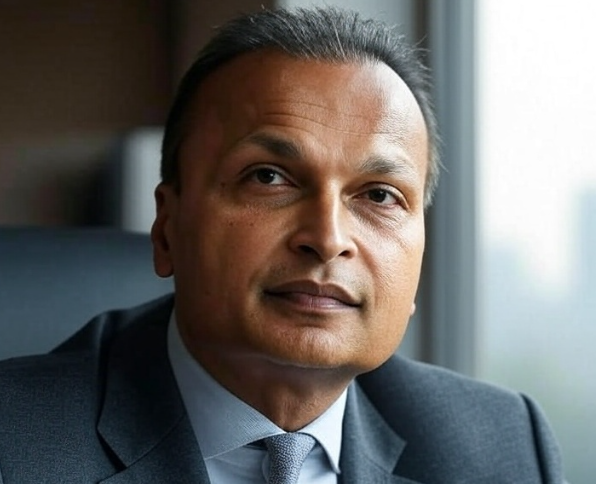
In 2008, Anil Ambani stood shoulder to shoulder with his elder brother Mukesh Ambani on the global rich list. While Mukesh was the 5th richest man in the world with a net worth of $43 billion, Anil followed closely at 6th with $42 billion. Fast forward to 2025, Mukesh Ambani’s wealth has surged past $125 billion, whereas Anil Ambani has declared himself bankrupt in a UK court. The contrasting trajectories of the two brothers could not be starker. And just when it seemed Anil was scripting a slow recovery, the Enforcement Directorate (ED) has come knocking on his doors, reigniting his legal battles.
Anil Ambani's hopes were pinned on two of his key companies — Reliance Power and Reliance Infrastructure. Both have recently turned profitable. Reliance Infrastructure has even become debt-free, while Reliance Power is gradually repaying its liabilities. These two entities appeared to be the silver lining in an otherwise dark cloud for the former billionaire.
But on Thursday, the ED raided offices of Anil Ambani’s companies in Mumbai, signaling deeper legal woes. The core of the issue lies in loans worth approximately ₹3,000 crore taken from Yes Bank by various Reliance Group companies. According to the ED, the funds were routed through shell companies and then cycled back into Reliance Group firms to repay older loans — a clear case of alleged money laundering.
There are two primary accusations being examined. Firstly, the use of shell companies — or ‘dummy entities’ — to siphon and reroute funds under false pretenses. While the loans were claimed to be for business purposes, the actual use was to repay previous debts. Secondly, the ED claims these shell companies paid bribes to Yes Bank officials to facilitate the loan disbursal. These two angles form the basis of a probe under the stringent Prevention of Money Laundering Act (PMLA).
The problems don’t end there. The State Bank of India (SBI) has declared loans worth ₹2,200 crore taken by Reliance Communications (RCom), another group company, as fraudulent. The basis of the accusation is similar — misuse of funds and using fresh loans to settle previous dues. As per RBI guidelines, once a loan is categorized as fraudulent by a bank, the case is typically escalated to the Central Bureau of Investigation (CBI). Though SBI hasn't yet forwarded the case to the CBI, sources suggest it may happen soon.
These legal troubles come at a time when Anil Ambani was attempting a comeback. Following the death of Dhirubhai Ambani in 2002, the Reliance empire was split between the two brothers. While Mukesh got control over petrochemicals and oil & gas, Anil took charge of emerging sectors like power, financial services, telecom, and entertainment. At that time, many believed that Anil had the more promising portfolio, and his companies initially lived up to expectations.
Reliance Capital, for instance, once had a higher market capitalization than even HDFC in 2008. Similarly, Reliance Communications was the second-largest telecom operator in India before the advent of Mukesh Ambani’s Jio. Anil also ventured aggressively into the media and entertainment space — launching Big FM, building cinema chains, and expanding rapidly across segments.
However, this rapid expansion came at a cost — mounting debt. And it was this web of borrowings that eventually brought Anil Ambani’s business empire to its knees. Over the years, several of his companies defaulted on debt obligations, and regulatory bodies began cracking down.
One such case involved Reliance Home Finance, where again, allegations of loan misappropriation were made. As a result, SEBI barred Anil Ambani from accessing the capital markets for five years and prohibited him from holding any executive or board position in listed companies. This forced him to relinquish active control of Reliance Infrastructure and Reliance Power. Consequently, these companies now claim Anil Ambani no longer has any operational role in their daily affairs.
Interestingly, despite the controversies, both Reliance Power and Reliance Infrastructure have seen a rally in their stock prices over the past year. Reliance Infrastructure shares have surged nearly 78%, while Reliance Power shares are up by around 90%, thanks to improving financial performance and reduction in debt.
But this newfound investor optimism might be at risk. With the ED now investigating financial irregularities, and the possibility of CBI involvement, investor confidence could again be shaken. Though the companies maintain that Anil Ambani is no longer involved in management, the shadow of past decisions continues to loom large.
The story of Anil Ambani is a textbook case of how fortunes can flip in the world of business. Once celebrated as India’s rising corporate star, his fall has been as dramatic as his rise. Now, with legal troubles mounting again just when signs of recovery were emerging, the road ahead looks uncertain.
Only time will tell whether Anil Ambani can emerge from this storm — or whether his past will continue to haunt what remains of his corporate legacy.




